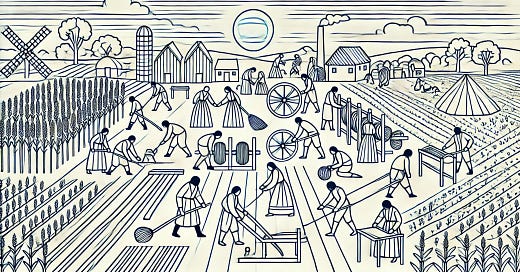Bees: British Indigenous Non-Monetary Resource Coordination Practices
Commitment Pooling in the UK
“The British are special. - In our island, we are different – different not just in our history, but in our spirit." – Margaret Thatcher
Let’s investigate where the spirit might have come from - shall we?
…. Once Upon a Time in a Field Far, Far Away…
Picture this: rolling green fields, the distant hum of conversation, and the rhythmic clinking of scythes against hay, reciprocal labor and common wealth. No, it’s not a scene from a medieval farming simulation—it’s the real-life story of Bees in what is now called the United Kingdom, a tradition that brought villages together long before the invention of currencies, smartphones or social media groups.
Old English Origin: The word “bēn” or “bene” originally meant a favor or request for help. Over time, this term evolved to “Bee” and represent gatherings where neighbors would assist each other reciprocally with significant tasks like plowing fields, making quilts, or even raising barns.
These Bees weren’t just about getting the job done; they were about building community, sharing food, laughs, and maybe a bit of friendly competition over who could stack hay the highest or husk corn the fastest.
From Early Fields to Roman Roads
Our story of Bees begins in pre-Roman Britain (~Pre-43 AD), where indigenous communities thrived on mutual support and cooperation. Imagine villagers gathering to plow fields or harvest crops, not because they had to, but because they wanted to. These early Bees were all about neighbors helping neighbors, ensuring everyone had what they needed to survive and thrive.
Then the Romans arrived in 43 AD, with their fancy togas and love for straight roads. They saw these communal Bees and thought, "What a great way to get things done—let’s make it mandatory!" And so, the Romans turned reciprocal voluntary labor into a structured and forced system for building their roads and forts. The cheerful hum of community cooperation slowly turned into the grumble of obligatory public works, with the friendly neighborhood bee evolving into something more akin to a labor tax.
Medieval Times: Lords, Ladies, and a Lot of Hay
Fast forward to the early medieval period, after the Romans had packed their bags and left. Bees started buzzing again in their original form—communal, voluntary, and full of life. Villagers once more gathered to plow, harvest, and build, enjoying the camaraderie and the fruits (or grains) of their labor.
But then came the feudal system. Lords and ladies decided (like the Romans) that communal Bees were a fantastic way to get free labor. Enter boon work, where peasants were required to provide extra days of labor for their lords, often during critical agricultural seasons. The cheerful gathering for a quilting bee was replaced again by a mandatory stint in the fields, with the community spirit overshadowed by the obligation to the manor.
Despite this, the tradition of Bees endured. During the high medieval period (1066 - 1500 AD), Bees were formalized and integrated into rural life. They remained essential for tasks like haymaking, plowing, and even building. These gatherings continued to be vital for both work and social interaction, the spirit of cooperation remained alive even under the watchful eye of feudal lords.
Modern Times: From Decline to Cultural Revival
The 19th century brought the Industrial Revolution, and with it, machines that could do the work of ten men in half the time. Communal Bees began to decline as mechanization made individual labor of those that owned the means of production more efficient. By the 20th century, the once-thriving tradition of Bees had nearly disappeared, replaced by factories, urbanization, and the hustle and bustle of modern life.
But wait! In the 21st century, something wonderful happened and continues. People started to remember the charm of these old traditions. Community gardens, neighborhood clean-ups, and volunteer building projects began to pop up, echoing the spirit of the old Bees. Modern versions of Bees have been revived as cultural events and practical community efforts, celebrating the heritage of communal labor and cooperation.
Types of Bees:
Let’s take a look at the diverse types of Bees that kept British villages buzzing over the centuries:
Ploughing Bees: Kicking off the agricultural year with communal plowing, often tied to the Plough Monday tradition.
Haymaking Bees: Summertime gatherings to cut, dry, and stack hay for winter fodder—imagine a haystack-building competition followed by a feast!
Harvesting Bees: Essential for bringing in the crops, with everyone pitching in to reap the rewards of the season.
Threshing Bees: Separating the wheat from the chaff in a communal effort, often accompanied by lively banter and shared meals.
Quilting Bees: Often a winter activity, where women gathered to create quilts, gossip, and enjoy each other's company.
Spinning Bees: Turning wool or flax into thread, a task made lighter by the shared company and perhaps a bit of singing.
Building Bees/Barn Raisings: Community construction projects that built barns, houses, and strong social ties.
Apple Paring Bees: Preparing apples for cider making or preserving, with plenty of tasting and toasting.
Corn Husking Bees: Husking corn for storage, often a prelude to a community feast.
Gleaning Bees: Gathering leftover crops from fields, ensuring nothing went to waste and providing for those in need.
Logging and Wood Cutting Bees: Preparing logs for construction or winter fuel, crucial for maintaining communal resources.
Fishing Bees: Coastal communities would gather to assist in seasonal fish harvests, sharing the bounty of the sea.
The Modern Bee: Still Buzzing with Purpose
This ancient British practice (dating back to Celtic Britons) is in many ways identical to indigenous practices often called Rotating Labor Associations world wide. I’m excited to be working with Grassroots Economics Foundation and many others to revive these ancient non-monetary resource coordination practices with systems like Sarafu.Network and protocols like Commitment Pooling. Please join us by researching and practicing the principals and protocols of healthy social infrastructure that have evolved across the planet.





Healthy social infrastructure